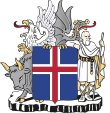| | |||||||||||||||||||||||||
| |||||||||||||||||||||||||
6 of the 14 seats in the Upper House of the Althing | |||||||||||||||||||||||||
| Turnout | 24.28% | ||||||||||||||||||||||||
|---|---|---|---|---|---|---|---|---|---|---|---|---|---|---|---|---|---|---|---|---|---|---|---|---|---|
This lists parties that won seats. See the complete results below.
| |||||||||||||||||||||||||
 |
|---|
Parliamentary elections were held in Iceland on 5 August 1916, [1] the first elections held after women's suffrage was introduced. [2] Following reforms to the Althing the previous year, the six seats in the Upper House appointed by the monarch were abolished, and replaced with six elected seats. [2] The seats were elected by proportional representation at the national level, using the D'Hondt method. [2] The remaining eight seats were elected along with the Lower House in October.